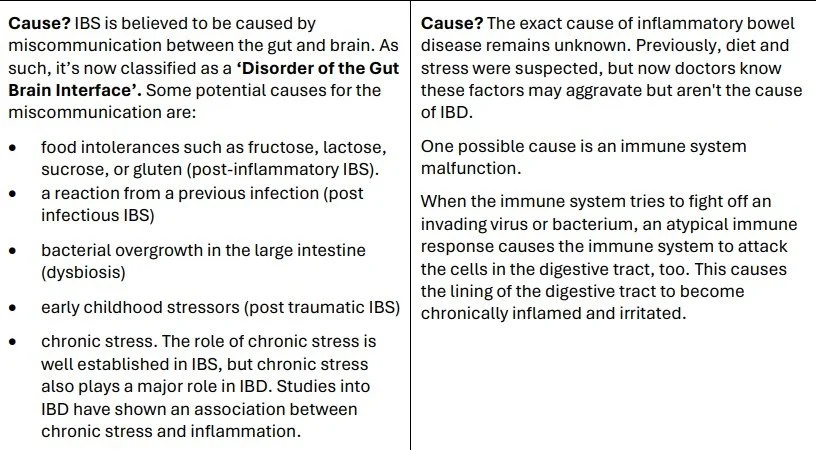I was recently contacted by someone diagnosed with Crohn’s disease, one of the two main types of Inflammatory Bowel Disease (IBD). The person’s doctor had suggested they consider gut directed hypnotherapy as part of their treatment plan.
I told the person that whilst there is considerable evidence to support the effectiveness of gut directed hypnotherapy (GDH) in reducing the symptoms of Irritable Bowel Syndrome (IBS) there is, as yet, hardly any research into whether GDH can help reduce the symptoms of IBD itself. However, I pointed out that hypnotherapy could help relieve the stress, anxiety, and pain that accompanies IBD.
The enquiry prompted me to write this blog post, in which I highlight the differences between the two conditions and the role gut directed hypnotherapy (GDH) can play in the treatment of them both.
Key Takeaways
Inflammatory bowel disease (IBD) is often confused with irritable bowel syndrome (IBS) a noninflammatory condition. Although the two conditions share similar names and some of the same symptoms, they’re two very different conditions with very different treatment requirements.
While both IBS and IBD present unique challenges, GDH has a role to play in the treatment of both conditions.
In the treatment of IBS, GDH aims to address the miscommunication between the gut and the brain, restoring normal functioning to the digestive system and thus easing symptoms. In controlled trials, GDH has been found to reduce IBS symptoms in 72% of patients, with the beneficial effects lasting up to at least five years after treatment.
In the treatment of IBD, GDH can help calm the nervous system, reduce chronic stress and anxiety, both of which help maintain and exacerbate the disease. It can also help with pain relief.
When GDH is used as an IBS treatment, and while individual experiences vary, many people experience improvements within a few weeks to a few months of starting a GDH program.
Let’s now look at some of the key differences between IBS and IBD.
A comparison between IBS and IBD:
Gut Directed Hypnotherapy (GDH) as a treatment for IBS and IBD
The most extensively explored psychological treatments for IBS and IBD are gut-directed hypnotherapy (GDH) and cognitive behavioural therapy (CBT).
Most of the research on GDH for adults has focused on IBS. Research supports the effectiveness of GDH in relieving the symptoms of IBS, with controlled trials and observational studies reporting symptom reduction in 24% to 73% of participants.
However, the effectiveness of GDH in managing IBD is less clear. Studies suggest GDH can benefit IBD patients with IBS-like symptoms, though for IBD alone, it is less effective than standard IBD treatments. A 2023 meta-analysis published in Lancet Gastroenterology and Hepatology concluded that psychological therapies do not appear to improve IBD nor prevent relapse of disease activity.
To date the few studies looking at the use of GDH for adults with IBD have focused on ulcerative colitis. For those with ulcerative colitis, one study highlighted an extension of symptom-free periods by an average of 78 days compared to controls, with long-term benefits observed in maintaining remission. One year later, 68% of people in the study still felt better and had fewer symptoms. Whether that kind of remission and symptom improvement applies to Crohn’s disease remains to be seen. There’s no direct evidence on the use of gut-directed hypnotherapy for adults with Crohn’s disease for those who don’t have IBS-type symptoms.
What we know is that hypnotherapy is effective at helping people reduce pain, chronic stress, anxiety, and lift depression. These are conditions that are frequently experienced by those with IBS and IBD and which can cause flare-ups and exacerbate symptom intensity.
While GDH has proven effective as a treatment for IBS it isn’t a quick fix. Most GDH programs involve weekly sessions, lasting from 30 to 60 minutes each, for 6 to 12 weeks. For the best results, the person needs to reinforce the work done during the sessions by listening, daily, to a hypnosis recording for at least the full 6 to 12 weeks.
It’s important to remember that GDH is a process and requires time, patience, and persistence to create lasting results.
What to learn more about how GDH can help you?
To learn more about GDH and my Hypnosis4ibs Program click here.














